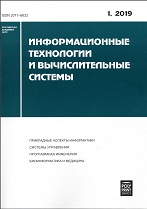|
MATH MODELING
Forecasting of COVID-19 dynamics in EU using randomized machine learning applied to dynamic models
A. Yu. Popkova, Yu. A. Dubnovab, Yu. S. Popkovac
a Federal Research Center "Computer Science and Control" of Russian Academy of Sciences, Moscow, Russia
b National Research University Higher School of Economics
c Institute of Control Sciences of Russian Academy of Sciences, Moscow
Abstract:
The work is devoted to application of the theory of Randomized Machine Learning to forecasting of the COVID-19 pandemic based on SIR epidemiological model. We propose two modelling variants, the first is based on estimation of SIR model using real case data, the second is based on the idea of modelling transmission coefficient and its prediction. Comparative study of proposed approach is based on a comparison with the standard least squares approach and is carried out on a dataset of several countries of the European Union. It is shown the performance of the proposed approach and its effectiveness and adequacy under conditions of small amount of data with a high level of uncertainty.
Keywords:
epidemic modelling, randomized machine learning, entropy, entropy estimation, forecasting, randomized forecasting.
Citation:
A. Yu. Popkov, Yu. A. Dubnov, Yu. S. Popkov, “Forecasting of COVID-19 dynamics in EU using randomized machine learning applied to dynamic models”, Informatsionnye Tekhnologii i Vychslitel'nye Sistemy, 2022, no. 3, 67–78
Linking options:
https://www.mathnet.ru/eng/itvs777 https://www.mathnet.ru/eng/itvs/y2022/i3/p67
|

| Statistics & downloads: |
| Abstract page: | 85 | | Full-text PDF : | 36 | | References: | 1 |
|




 Contact us:
Contact us: Terms of Use
Terms of Use
 Registration to the website
Registration to the website Logotypes
Logotypes









 Citation in format
Citation in format 